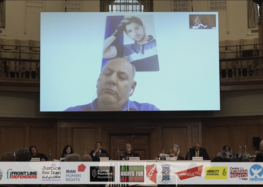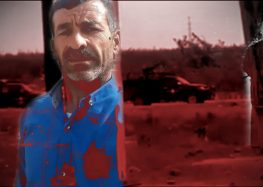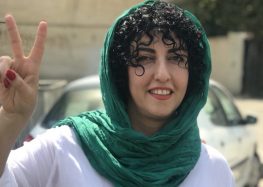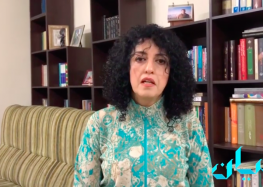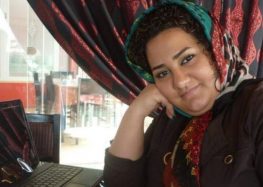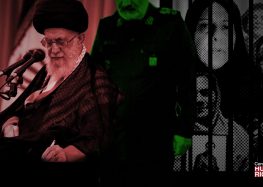Public Outrage Grows As Reports of Bloody Crackdown Emerge: “Every Corner of Iran is Mourning the Atrocities”
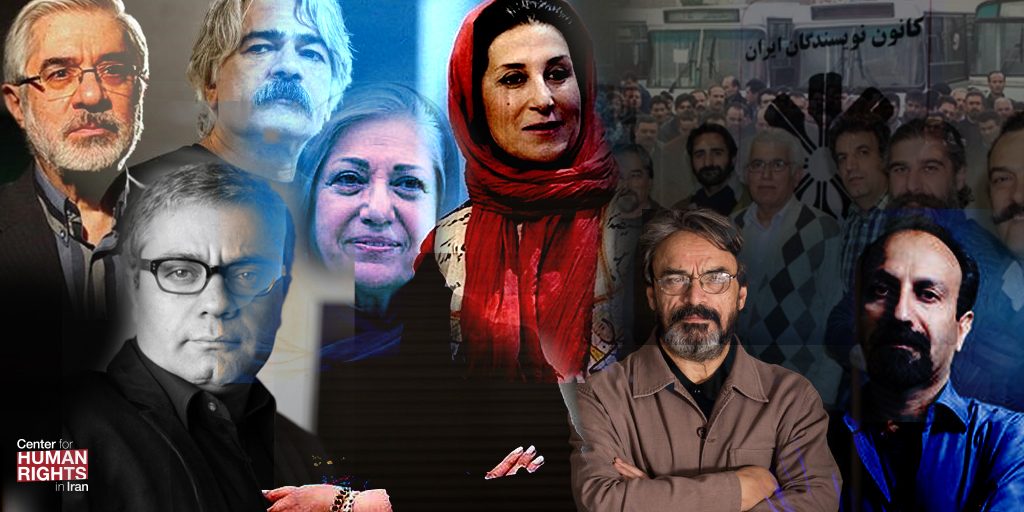
Public Outrage Grows As Reports of Bloody Crackdown Emerge: “Every Corner of Iran is Mourning the Atrocities”
As reports of the unprecedented state violence against protestors in Iran begin to emerge now that the state-imposed internet shut-down has been lifted, the full extent of the state’s brutal crackdown is being revealed and Iranians have been reacting with outrage and grief.
The protests began after the sudden increase in the price of rationed gasoline by 50 percent on November 15, 2019. The state reacted by cutting off the people’s access to the Internet and using unprecedented lethal force to crush the unrest, including the firing of live ammunition into crowds of unarmed civilians. Current estimates of the number killed are over two hundred, and perhaps significantly higher. Many more were injured and thousands arrested.
Writers Condemn Crackdown
The Iranian Writers Association (IWA) issued a statement on December 1 condemning the crackdown and demanding the immediate release of detainees who have been “denied their human rights for expressing their opinion or protesting.”
“Every corner of Iran is mourning the atrocities left behind from the confrontation between the people and the authorities,” the statement said. “The monster, who previously silenced the people with deceitful fangs of intimidation and oppression and interrogated free thinkers and activists in dark dungeons, held them for long periods, tried them behind closed doors, imprisoned them based on forced confessions and banned them for working or leaving the country, has now put its secret detention centers at the disposal of unknown agencies and openly assaulted protesters with bullets for shouting what they had held back in their throat.”
The statement continued: “Fearing that the truth would reach the world, Iran became the first state to resort to the darkest form of censorship by cutting all access to the internet and imposing complete silence in order to fire bullets at protesters who, like their forefathers in the [1905] Constitutional Revolution, have been fighting for a better life, while being denied the most basic human rights, happiness, a future, beauty, art and culture, or even the right to make a living.
“By cutting off the internet nationwide, the authorities not only silenced the people of Iran but also wasted resources and brought great harm to their livelihood. A huge portion of the country’s economic wealth was spent on unprecedented efforts to prevent the people from connecting with the world through cyberspace… while the regime’s forces used false excuses to justify suppressing protesters’ chants by violently arresting and killing thousands.”
Artists Issue Statement
A group of prominent artists in the film and theater industry also issued a statement on November 30 condemning the killing of people who were “fed up” with the status quo.
“No one can forget the bitter days of November: the faces of young people who lost their lives, the people who were wounded, the mothers who were in mourning and the fathers who had no patience,” said the statement.
“The wishes of honorable young men, whose blood was spilt by incompetence, are being ignored with accusations that they had ties to foreigners. The name and identity of every single person who was killed will become clear as the dust settles and the flow of information and communication resumes. What was their crime? They were only fed up with not being heard. They were shouting against incompetence.”
Those who signed the statement included Rakhshan Banietemad (film director), Asghar Farhadi (film director), Mohammad Rasoulof (film director), Reza Dormishian (film director), Tahmineh Milani (film director), Manijeh Hekmat (film director), Mahtab Nasirpour (actress and producer), Lili Golestan (literary translator, art gallery owner), Bahman Farmanara (film director), Mohammad Rahmanian (theater director), Baran Kosari (actress) and Pegah Ahangarani (film director and actress).
Statements from Former Presidential Candidates Mir Hossein Mousavi and Mehdi Karroubi
Former Prime Minister Mir Hossein Mousavi and former Parliament Speaker Mehdi Karroubi, both also former presidential candidates in Iran who, along with Zahra Rahvanard, have been under extra-judicial house arrest for almost nine years, also condemned the brutal crackdown.
Mousavi compared the killing of protesters to the “Jaleh Square massacre” carried out by the military in Tehran months before Iran’s 1979 revolution against the monarchy.
“The harsh and bloody response toward angry, fed-up, destitute people, who had come to the streets to protest an irrational commercial decision against the poor masses who were already damaged by ruinous policies, and the large protests in Tehran and other parts of the country, are an indication of nationwide disillusionment among all sectors of a disgruntled society — a situation very reminiscent of the ruthless bloody massacre of innocent people on September 8, 1978,” Mousavi’s said in a statement on November 30.
“In 1978, the killers represented a non-religious state, but in November 2019, they took orders from a religious state. Back then [Mohammad Reza] Shah was the Commander-in-Chief. Today it is the Religious [Supreme] Leader who holds absolute authority,” he added.
Mousavi described the victims of November’s unrest as “innocent martyrs” and added: “The wounds inflicted on the people will not heal until those responsible for these massacres are put on trial in open courts and a clear explanation is given for these crimes. Otherwise talking down to the people and comparing the protests to a ‘world war’ are not going to be satisfactory. They will not be enough to heal the deep and dangerous wounds inflicted on the people. The regime should just remember what happened in the aftermath of the Jaleh Square massacre.”
Mehdi Karroubi, in his November 28 statement, criticized the political and religious elite for their silence toward recent “atrocities.”
“Unilateral sanctions [by the US] have not only broken the backs of poor sectors of society, but also provided an excuse for the state to implement [feudalist] policies reminiscent of the Qajar era, which will only result in greater corruption and discrimination at all levels of the state,” he said.
“It is surprising that nobody has instructed the new commander of the Islamic Revolutionary Guard Corps (IRGC) and another one of its officers to stop comparing the people’s protests to an all-out world war, knowing that such mindless language would undoubtedly further inflame popular anger and disgust.”
Also on November 27, Iran’s former (reformist) President Mohammad Khatami posted a message on Instagram saying the people’s grievances were “deep-rooted” and emphasized that “no government has the right to resort to force and oppression in confronting protests.”
Tehran Bus Driver Union’s Reaction
Iran’s Union of Workers of the Tehran and Suburbs Bus Company (UWTSBC), which has over 17,000 members, also issued a statement on December 1, “strongly and firmly condemning” the state’s bloody response to the protests.
“The protests by the poor and pained masses have been crushed in the bloodiest and most ruthless fashion possible. Hundreds of people, including those as young as 13 and 14, have been shot dead. More than 1,000 people have been injured and more than 8,000 detained. In an unprecedented move, the state authorities also cut off the internet throughout the country and in some regions, they even made mobile phone communication impossible.
“In an absolute violent display, the authorities relied on the military and security forces, as well as plain-clothed agents, to fire bullets directly at the people, hoping to silence protests by the oppressed. The regime and security forces deceitfully claim that they respect the right to hold peaceful protests, even though for years they have responded to every non-violent rally by workers, teachers, students, etc., with force and condemned activists to long prison terms, without hearing their complaints.”
The UWTSBC’s statement said the latest protests are the continuation of the unrest that erupted in December 2017 and has its roots in “more than three decades of unbridled capitalist aggression on the working class and poor masses of the country.”
Calls for Accountability Mount as Families Are Made to Pay to Retrieve the Bodies of Their Loved Ones
The Iranian government has so far not released any numbers on those killed, injured or arrested, even amidst mounting calls for state accountability for the state’s violence both inside Iran and internationally.
In addition to the unlawful use of lethal force against protestors, there are increasing reports that when individuals are allowed to collect the bodies of their loves ones, they are being forced to pay for the privilege, and that agents watch over funerals conducted by the families.

